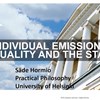earners

The (New) Case for Wage-Earner Funds
Research seminar with Markus Furendal, Post-Doc in Political Science, Stockholm University, and Martin O'Neill, Professor of Philosophy at University of York. Abstract In our presentation we make the

Säde Hormio: Individual emissions, equality and the state
Seminar with Säde Hormio, researcher in Practical Philosophy at the University of Helsinki. ABSTRACT The amount of greenhouse gases that can still be emitted to the atmosphere is very limited if global
Säde Hormio: Individual emissions, equality and the state
Seminar with Säde Hormio, researcher in Practical Philosophy and Marie Skłodowska-Curie Fellow at the University of Helsinki. REGISTER Abstract The amount of greenhouse gases that can still be emitted to
Moulding Parents’ Childcare? A Comparative Analysis of Paid Work and Time with Children in Different Family Policy Models
Pp. 207-230 in Drobnic, S. and Guillén, A. (eds.) M. Work-Life Balance in Europe – The Role of Job Quality Palgrave Publishers Ltd. Abstract We analyze the relationships between parents’ paid work and act
Family Policy, Perceived Stress and Work-Family Conflict. A Comparative Analysis of Women in 20 Welfare States
Individual- and country-level factors are brought together in simultaneous analyses of their relationships with perceived stress and work-family conflict for women. The hypotheses predicting higher st
Swedish Parental Leave and Gender Equality. Achievements and Reform Challenges in a European Perspective
This study sets out to discuss the Swedish parental leave system and identify achievements, policy dilemmas and reform alternatives in a European perspective. In perspective of changing demographic st
Welfare States, Social Structure and the Dynamics of Poverty Rates. A comparative study of 16 countries, 1980-2000
This paper attempts to explain temporal and spatial variation of poverty rates in terms of unemployment insurance and socio-demographic factors, and test the ‘convergence hypothesis’ of the poverty ra
Completed: The organization of violent extremism and anti-social careers
How are environments of violent extremism organized? How do people move between these, in and out of these and what do their criminal careers look like?
Drifting Out of Crime: Criminal Careers, Maturational Reform, and Desistance From Crime
In: Delinquency and Drift Revisited: The Criminology of David Matza and Beyond. Advances in Criminological Theory Vol. 21, eds. Thomas G. Blomberg, Frank T. Cullen, Cheryl Johnson & Christoffer Ca








